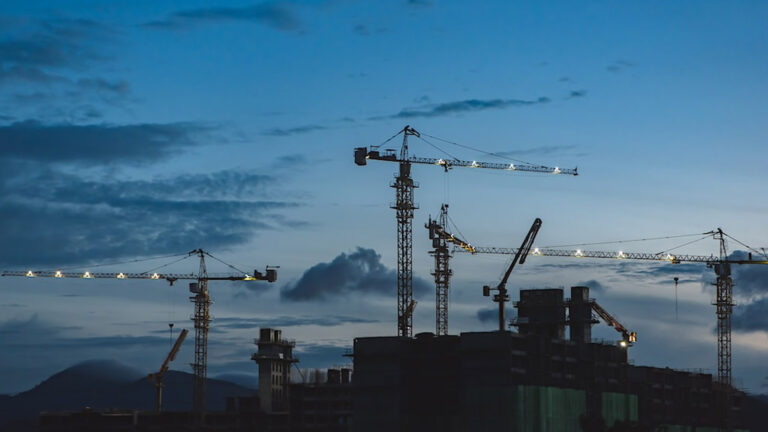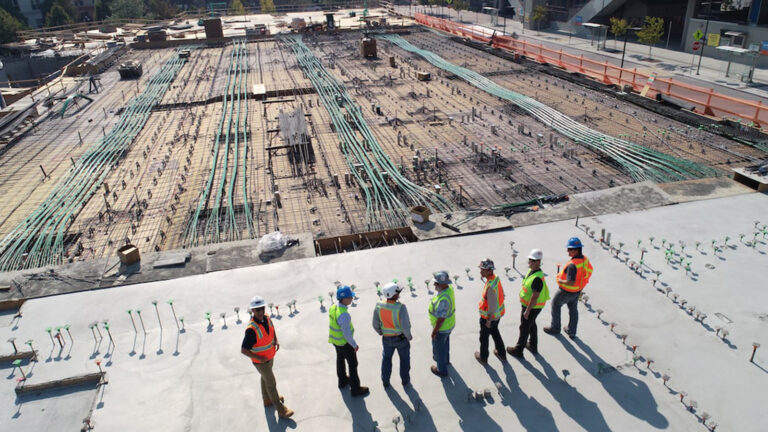
If you’re a construction manager or work in the building industry, then you know that project management is a crucial part of success. Even though navigating through the difficulties of managing a build-up can be tough, it’s essential to boost efficiency at its peak. To give assistance and make sure your projects land on their feet, here are our top ten tips for successful project management within buildings! With these instructions handy under your belt -you’ll have no worry facing any challenge making every task more efficient and rewarding! But how do we start? Well first off let’s take a look into…
Understanding the Basics of Construction Project Management
Managing the intricacies of a construction project can be intimidating, particularly if you’re not used to it. To guarantee that projects are completed on schedule and inside spending plan, venture supervisors should have an exceptional mix of specialized and social abilities. It’s vital to comprehend the essentials of development task the board so as to build effectiveness and decrease conceivable dangers.
The primary thing in any effective construction undertaking is arranging. This incorporates setting unmistakable objectives, building up timetables, recognizing assets, making financial plans lastly appointing errands
It’s essential to take into account any risks that could come with the project and plan for them. Having a good game-plan will help keep projects running smoothly so they can be finished within their time frame and cost limits. The next step is communication; among team members as well as between customers, clients, or owners. Keeping regular meetings helps make sure everyone involved knows about what progress has been made towards reaching goals – or if there are issues holding things back from being completed on schedule.
Project managers should also keep stakeholders informed about how their investments are progressing by regularly providing updates. Furthermore, it’s necessary to mitigate any potential issues before they arise with effective risk management. To prevent delays or cost overruns, project managers need to be detail-oriented when looking out for things that could go wrong such as changing weather patterns and personnel shifts during the course of the project life cycle. Proper risk assessment can help avoid unwanted surprises in late stages on an undertaking timeline. Have you ever had a time where something unexpected sneaked up near completion?
Importance of Planning in Successful Projects
Project planning is crucial for any construction project. It’s paramount that the client, contractor and everyone else involved have a good understanding of what needs to be done and when it should be finished. Good execution ensures all tasks are completed punctually without exceeding budget or facing unexpected delays which could lead to cost overruns. To ensure a successful venture, Project Managers break down each task into smaller components while assigning them their own timelines – this helps visualise workload more effectively in order to achieve desired goals with minimal effort!
Project management in the construction industry is all about having a plan and understanding what needs to be done. This helps everyone involved comprehend exactly how each task or phase of work should be completed effectively – making sure deadlines are met on time, identifying potential delays due to external factors, etc. Being able budget accordingly for materials, labor costs and overhead expenses before getting started is just as important; this way you can anticipate any possible cost-related issues from the very beginning while also avoiding unnecessary expenditures later down the road should unexpected situations arise. In other words: preparing appropriately ahead of jumping into actual work will pay off big time!
Techniques for Efficiency Maximization in Construction
When it comes to successful project management in the construction field, efficiency is key. Boosting output while minimizing costs and resources as much as possible are essential for ensuring a success story of any kind of building job. Everyone involved must acknowledge how significant effectiveness and proficiency are before attempting to apply useful tactics into practice. There’re several approaches that can rise productivity on construct operations which include: 1) Planning Ahead: One of the most pivotal elements when managing a task efficiently is having insight ahead so one should definitely be looking forward rather than backtracking all the time?
Taking the time to plan out each and every stage of a construction project is important for ensuring that everyone involved knows exactly what needs to be done and also how it should be completed in order to maximize efficiency. It’s essential, however, that all key resources are identified before any work starts on site – this helps ensure everything goes as smoothly as possible. But how do you know which resources will actually help? What kind of details should you look into when searching for these crucial assets?
Without accurate answers, your project could end up being slowed down or taking longer than expected – something no one wants! Having an accurate inventory of materials, equipment, personnel and other resources is essential if you want to avoid delays or setbacks during the job. Knowing what supplies are available up front can help prevent costly problems down the line due to a lack of necessary items or personnel shortages.
Using technology can also be beneficial when it comes to increasing efficiency in construction sites by automating processes such as scheduling tasks and tracking material usage from beginning until end on any given project site. Utilizing technology not only allows managers better visibility into operations throughout all stages but could expose potential issues before they become too expensive for budgeting purposes. Communication plays an important role when managing efficient projects within construction settings since miscommunication-based delays might cost lots precious time and money that was originally intended for another purpose -so proper communication between team members should be established quickly enough so these types of losses don’t happen at all!
Role of Communication in Project Management
Effective communication is a must in successful project management within the construction industry. Everyone, including contractors and subcontractors as well as clients, must communicate clearly to stay on track with schedules and budgets. To guarantee that everybody involved stays connected throughout the entire process of managing projects it’s wise to set up ground rules right away which should include how often everyone has to keep each other updated along with what information will need sharing. How else can we make sure all parties are effectively communicating?
It’s super important for everyone involved to understand their responsibilities and who they should go to with any concerns or issues. The next step is making sure you have a foolproof tracking system in place while the project progresses – this includes assigning tasks, setting targets so everybody knows what needs doing and when it has to be completed by. Communication between all parties must happen after each task completion; that way, if anyone comes across risks or possible obstacles along the way we can act swiftly before those problems get out of hand – which would cost time and money! Furthermore, regular updates will give us more insight into how much further progress can realistically be made from then on — allowing us to plan better for future ventures too.
Navigating Challenges and Problem-Solving Strategies
It’s essential to have problem-solving strategies in order to successfully manage a construction project. Although the workload is immense, an effective strategy can help reduce mistakes and increase efficiency. To do this, it’s crucial that we identify potential issues; assess how serious they are and come up with solutions that will address them quickly and effectively.
Communication between all individuals involved in the project plays a huge part when creating your problem solving skills – so be sure you don’t neglect it! Having open conversations amongst everyone concerned helps ensure no stone goes unturned as well as helping prevent any surprise problems from sneaking through unnoticed.
Talking about communication, it is important to use both verbal and written means. The latter can be in form of emails or meeting minutes which should clearly outline any expectations, deadlines, milestones etc. relevant for completing the task/project on time and without going over budget. This way everyone involved will always stay informed with regards to changes that may have occurred or possible roadblocks so they can address these problems quickly before then become a major issue!
It’s critical for project managers to anticipate potential risks associated with each task or milestone, along with their solutions, before they become real issues that hinder progress and add unneeded expenses or delays. This means being nimble when developing fresh ideas to mitigate risk within budgets/timelines while still producing top-notch outcomes on time. Moreover, it’s important to keep an open mind in analyzing problems as there might be multiple answers based on the resources at hand and individual expertise of team members. Looking into all possibilities rather than just sticking with one plan helps make sure no quality standards are compromised by taking shortcuts only out of convenience instead of necessity.
Keys to Success: Monitoring and Control Measures
Any professional construction manager knows the value of successful project management. Proper checks and balances are key to making sure projects don’t get out of hand, leading to delays or worse consequences. To keep your projects going according to plan and hit those goals, it’s wise create a system for tracking progress regularly so any changes you need can be quickly made. Here are some tips on how best set this up: An important first step is creating a checklist that covers all milestones necessary for moving the project forward.
Having a list of to-dos is an important part of the building process – from getting permits and supplies, right down to completing certain tasks. To get everybody on the same page in terms of monitoring progress and taking corrective action if needed, it’s essential you create an action plan for each item on that list. This means scheduling regular reviews as well as coordinating any changes that need to happen when something goes off track or doesn’t pass inspection. Additionally, critical performance indicators (KPIs) are another great way to ensure effective tracking and management measures have been put in place.
KPIs (key performance indicators) are a great way of determining progress on the project life cycle – you can get tangible data that’ll help quantify efficiency and accuracy, rather than just relying on subjective reports or opinions. It’s recommended to set up both short-term targets which measure achievement over shorter periods such as weeks/months, plus longer-term goals for bigger objectives e.g budget during different phases of construction work – this will identify any problems quickly before they become major hurdles down the line! It’s also important to keep everyone involved in communication loops throughout; especially when it comes to clients who would like regular updates but may not understand all aspects of construction processes anyway. Reports should be shared with stakeholders at every stage so they’re always aware where things stand – being open & transparent about statuses is essential if trust between contractor and client is expected! And often times helps bring projects closer towards completion faster too 😉
Case Study Analysis on Effective Construction Project Management
Doing a thorough case study analysis is the first step to being successful in project management for construction sector. Studying previous projects can help you figure out what worked and more importantly, what didn’t work. Doing so can give you useful insights into potential areas of improvement that could be beneficial when planning your next project. This type of research will enable you to create an effective overall strategy as it gives insight into different approaches such as budgeting, resource allocation etcetera . It also helps with precision and accuracy on planning stages down the line!
Case studies are a big asset for project managers as they offer up tangible experiences of how diverse methods were used and what kind of results came out. It also offers potential risks or other complications that could come to play while implementing, so the manager can get ready if similar conditions appear in their projects down the line. Moreover, it enables you to recognize which strategies have been most successful previously – this would allow you replicate those practices going ahead. Lastly, case studies give an opportunity to see how some processes or techniques played out within certain contexts – allowing teams modify them accordingly based on their individual use cases when required. In summary then; Case Studies provide invaluable insights into tackling any task related with project management: from guiding strategy selection/modification through providing insight into pitfalls & challenges
In conclusion, project management in construction can be a tricky endeavor. There are many steps that need to be taken and it’s essential for every business owner or manager to have the right strategies in place if they want their projects to run smoothly. This guide has outlined ten key tips that will help you get your project off on the right foot and ensure its success. From navigating any challenges along the way, allocating resources properly, scheduling tasks effectively; these pointers should give you an idea of how best to approach managing your next big undertaking so as maximize efficiency throughout while meeting deadlines and keeping costs down too. So why not put them into practice today?
Are you looking to take your construction project management abilities up a notch? Then, it’s time to connect with Hanthel Consulting right away! Our professional insights and bespoke solutions will enable you make the most of your venture while ensuring its seamless functioning. We are focused on helping our customers reach their goals, so whatever special needs that this particular job requires – we have just what you need. Boasting decades in the biz along with an expert crew consisting highly-competent professionals who can offer impressive services customized for each client; plus reasonable fees alongside accommodating payment possibilities – there won’t be any waiting around: contact us now and find out how Hanthel Consulting can help boost your success!



